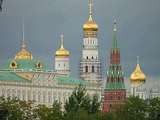The Lavrov Assessment
By Mark N Katz for ISN
Russian Foreign Minister Sergey Lavrov gave a speech at the Carnegie Endowment in Washington, DC on 7 May, discussing how to improve US-Russia relations. Lavrov made clear that he regards US foreign policy as the cause of the deterioration in relations and suggested ways forward.
Lavrov especially blamed the Bush administration’s actions for this state of affairs, citing missile defense plans for Eastern Europe, “hectic NATO expansion,” and “attempts to punish” Russia as a result of the August 2008 Russian-Georgian conflict. He applauded the new administration’s desire to “develop a constructive bilateral relationship.”
The foreign minister pointed out that the START I Treaty expires later this year, and made clear that Moscow did not favor extending it. Instead, Moscow wants a new treaty negotiated and agreed upon before START I’s expiration. On missile defense, he reiterated Putin’s July 2007 offer to Bush (which called for the US to halt its missile defense plans in Eastern Europe, and for America and Russia to jointly use Russia’s Gabala radar facility in Azerbaijan). In addition, he called upon the US to ratify the Comprehensive Test Ban Treaty (CTBT).
He also called for “a real internationalization of the settlement in Afghanistan” in particular.
On Iran, Lavrov noted that Moscow was “prepared to assist” Washington in achieving “greater mutual understanding” with Tehran, but did not specify how Russia could or would do this. He expressed a similarly unspecified helpfulness regarding North Korea.
Regarding the global financial crisis, Lavrov called for Russia, along with the US, to be among those “working out universal rules and procedures which would be obligatory for all countries without exception.”
In sum, Lavrov’s recipe for improving Russian-American ties is for Washington to stop doing things that Moscow does not like, and for Washington to work with Moscow in resolving such issues as Afghanistan, Iran, North Korea and even the global financial crisis.
Lavrov does not acknowledge that the experience of Soviet occupation played an important role in instilling a lack of trust for Russia in Eastern European states as well as some former Soviet ones, and that they have sought NATO membership not to threaten Russia, but to protect themselves against it.
Nor did Lavrov even acknowledge the possibility that a friendlier, more self-restrained Russian approach toward its neighbors could result in their responding in kind.
The US, of course, could and should - as Lavrov pointed out - do more to improve US-Russian relations. The Bush administration’s unilateral withdrawal from the ABM Treaty and intervention in Iraq without UN Security Council (including Russian) approval shortly after then-president Vladimir Putin had gone out of his way to support the US post-9/11 by allowing the US to acquire military facilities in former Soviet Central Asia was understandably resented in Moscow. And, as Lavrov pointed out, the US should not have blocked “the work of the NATO-Russia Council” after the start of the August 2008 Russia-Georgia conflict. After all, if the NATO-Russia Council will not deal with an issue such as this, then of what real use is it?
But if Russian-American relations are really going to improve, it is not just American foreign policy that will need to change. Russia’s approach to the world - especially its neighbors - will need to as well.

